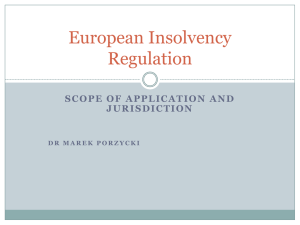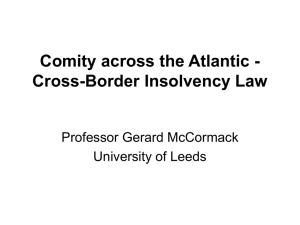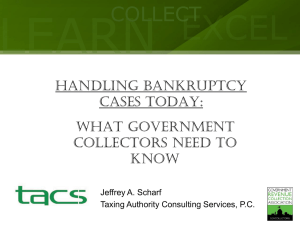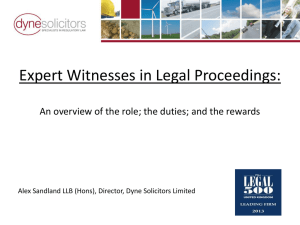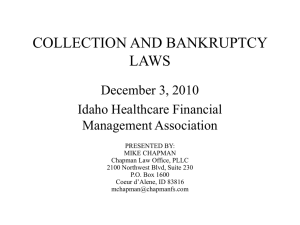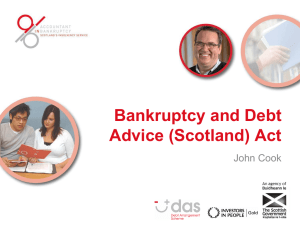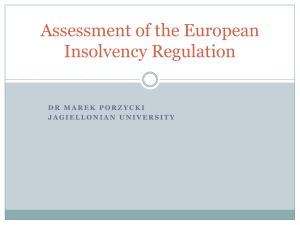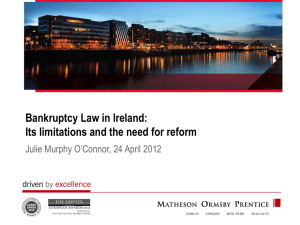International insolvency law
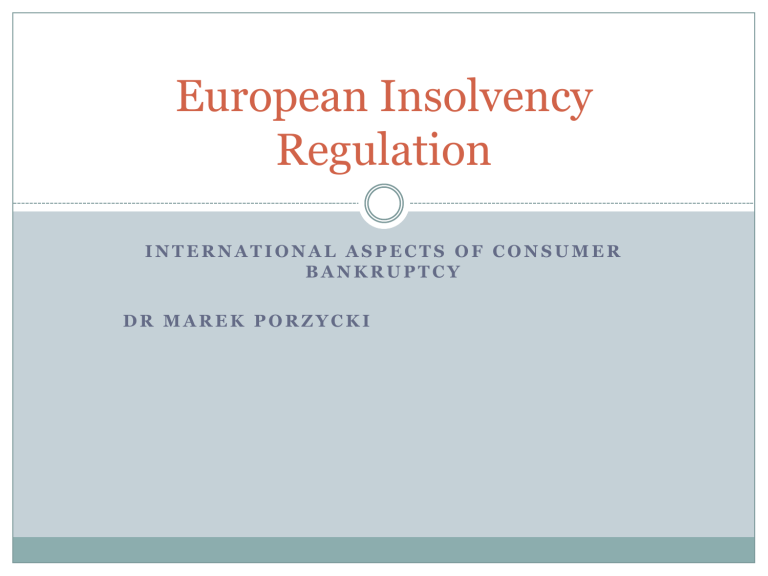
European Insolvency
Regulation
I N T E R N A T I O N A L A S P E C T S O F C O N S U M E R
B A N K R U P T C Y
D R M A R E K P O R Z Y C K I
Concept of consumer bankruptcy - 1
-
-
-
Traditional approach of bankruptcy law – intended for traders, as collective enforcement of debts concentrated on creditor interest
Problem of excessive indebtedness of natural persons („debt trap”): puts the persons in question outside the scope of the formal economy social exclusion, stigmatization, negative consequences for families eliminates the debtors as consumers and taxpayers surge of consumer debt in developed market economies
Concept of consumer bankruptcy - 2
-
-
answer of (national) legislators: „fresh start” into life without debts
Negative consequences of rigid and liberal approaches: too rigid see previous slide too liberal moral hazard (encouragement to run into more debt), increased risk for banks (and for depositors), increased cost of credit
National consumer bankruptcy law - 1
-
-
different answers of national legislators usually some possibility of discharge of debts within insolvency proceedings (or a specific type of insolvency proceedings), main role of the court: e.g.
Germany, Poland within separate (non-insolvency) proceedings, main role of specific administrative bodies created for this purpose: e.g. France, some of the earlier draft laws in
Poland
National consumer bankruptcy law - 2
-
-
-
-
varying extent of the discharge (some debts may be left untouched; in some cases they are not fully discharged but transformed into natural obligations) more or less stringent requirements for the opening of proceedings lack of fault of the debtor at his own insolvency (concept of
„deserving debtor”) limitations as regards frequency of discharge (e.g. no more often than once in 10 years, once in a lifetime) diverse procedural approaches: discharge on basis of a one-off decision discharge only after a certain period under supervision/of regular payments to the creditors („good behaviour period”)
Consumer bankruptcy under the EIR
-
-
-
consumer bankruptcy proceedings are included in the EIR, provided they are listed in Annex A and a liquidator listed in Annex C is appointed. Examples:
Polish proceedings – included as upadłość obejmująca likwidację
German proceedings – included as
Insolvenzverfahren
French proceedings - procédure de rétablissement
personnel under the Code de consommation is NOT included in Annex A the EIR does not apply
COMI in consumer bankruptcy
standard rules for natural persons apply – see recital
13 for debtors not conducting any business activity: habitual residence ( cf. cases of Jan K. in
Słubice/Frankfurt in presentation 5) incentives for forum shopping cf. ECJ in Case C-
1/04 (Staubitz-Schreiber) existence of specialized advisors arranging discharge in a selected jurisdiction
Effectiveness of discharge in consumer bankruptcy under the EIR
law of the State of the opening of proceedings applies to creditors’ rights after the closure of proceedings
(Art. 4(2)(k) of the EIR) judgment on discharge is usually automatically recognized under Art. 25 (1) of the EIR such discharge applies and is effective for claims accross the EU even if the claims in question are not governed by the law of the State of opening of proceedings!
Example
Herbert H. lived near Opole, Poland. In 2001 he divorced his wife
Bożena H. Custody of their 2 children (born 1997 and 1999) was awarded to Ms. H. The court also awarded her and the children almony payments of 1500 PLN per month.
In 2002 Mr H. moved to Germany. His almony payments were irregular. Altogether in 2009 he owed more than 40.000 PLN in unpaid almony. In August 2004 Mr H. requested the opening of insolvency proceedings in Germany and applied for a discharge of his debts. Following a „good behaviour period ”, the German court granted him discharge in 2010. According to German law, no exception is provided for almony claims, which are fully discharged in consumer insolvency proceedings.
Can Ms H. claim unpaid almony from Mr H. before a Polish court?
Secondary proceedings in consumer cases?
-
-
-
not excluded in theory, but an exception in practice:
Secondary proceedings are possible only where the establishment of the debtor is situated (Art. 3(2) of the EIR), defined as place of operations where the debtor carries out a non-transitory economic activity with human means and goods (Art. 2 (h) of the EIR)
„economic activity” is understood in a broad manner, not necessarily as business or commercial activity (non-profit activities are also included),
„human means and goods” – requires a minimum degree of organisation, including hiring persons for whom the debtor is responsible as employer or principal usually done within a business example of a construction site belonging to the debtor and managed by him
Practical example – ECJ in Case C-461/11
ECJ judgment of 8 November 2012, Case C-461/11, Ulf Kazimierz
Radziejewski
Swedish debt relief proceedings – not listed in Annex A and without divestment of the debtor EIR does not apply
Based on decision of an administrative authority, which cannot be considered „court or tribunal” in the meaning of Article 32 of the „Brussels” I Regulation „Brussels I” Regulation does not apply
EU law does not oblige Member State to recognize Swedish debt relief
A requirement of Swedish law that the debtor resides in Sweden to obtain debt relief is an unlawful restriction of the freedom of movement, prohibited by Article 45 TFEU
